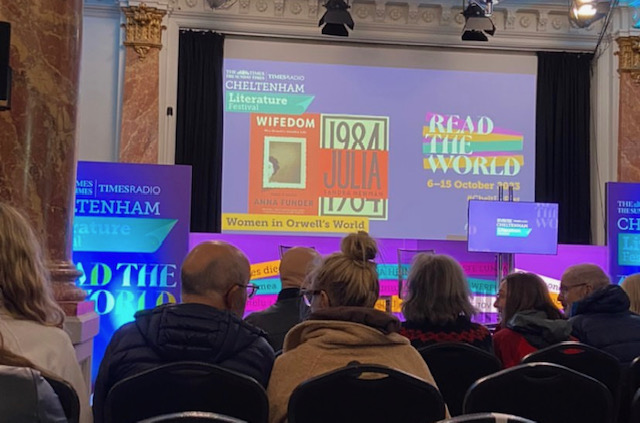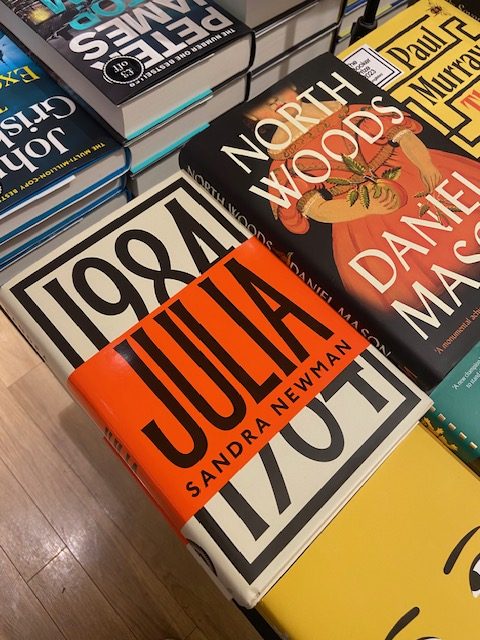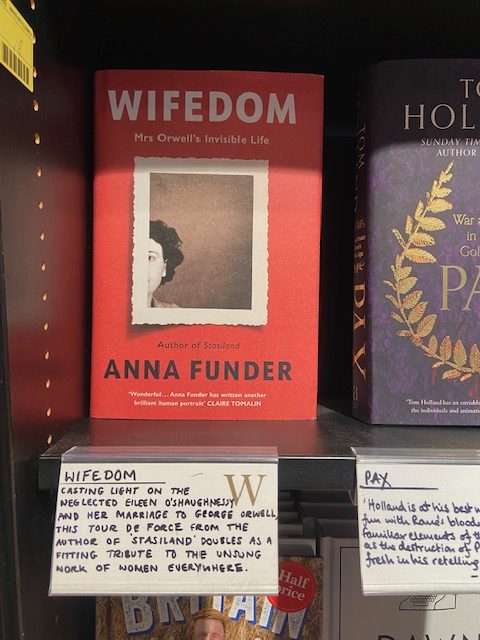Words by Katie Storrie
Casting a new light on how women in Orwell’s worlds should be recognised and celebrated. Sandra Newman and Anna Funder discuss their new publications at this year’s Cheltenham Literature Festival.
Orwell himself will always hold credit to his extraordinary work. I was first introduced to Animal farm and then 1984 during my teenage years and I became highly immersed in the debates and discussions surrounding them. I also fell in love with his prose and soon acknowledged how and why he would forever be influential.
When I sat down to watch Newman and Funder at the Cheltenham Literature Festival, I went in open-minded and eager to learn how they had been impacted by Orwell’s work. I wanted to learn why they wanted to shine a light in commemorating women. They began by discussing their works: Julia, by Sandra Newman, and Wifedom, by Anna Funder. I quickly became in ore of their feminist re-telling. I found it incredibly empowering how they invested the need for women to be remembered and recognised.

WOMENS PERSPECTIVE IN ORWELL’S LIFE AND WORKS
Funder begins by introducing the synopsis of her book. She recreates the story of Eilleen Shaughnessy, the wife of Orwell, incorporating both fact and fiction. One of the things that stood out to me was how she showcased the vulnerability and personal intimacy of Eilleen in the letters, where she addresses her close friends about her relations with her husband. I found it incredibly insightful how Funder decided to incorporate Eilleen’s letters throughout her book, to showcase her individual thoughts and experiences. We get to gain a perspective of Eileen’s previous thoughts, that were previously neglected.
In the original works of 1984, we never get to see the thoughts and perspectives of Julia. Newman began to address this and suggested that the character Julia can only be interpreted as someone who drives the plot forward. In Julia, Newman emancipates her from this previous deception and presents Julia in a new light. Through Newman’s retelling of 1984, Julia becomes a more prominent character. Reading a section from the opening of her book, Newman gave us an insight into how her imaginative skills are used in a well-credited way.
Funder and Newman then spoke about how we share a universal experience in being introduced to Orwell. They talked about how he can be a central figure to many. Yet, they went on to talk about how the experience of reading Orwell is incredibly subjective to an individual. Reading Orwell’s work in 2023 will be very different to reading it when it was first published. They discussed how this, too, can influence literacy critiques, especially about the effects of totalitarianism and how women are placed in institutions.
THE PUBLIC AND PRIVATE LIFE OF WOMEN IN ORWELL’S LIFE AND WORKS
Funder talked about the significance of Elieen in Orwell’s life and how she as an individual influenced his works immensely. Yet, Elieen remained a silent figure in Orwell’s life, especially to the public. Funder addresses that if she was not around, Orwell himself would have never been successful. “A man’s private life is where a woman lives”.
This quote particularly struck me when Funder said it in a conversation. Funder highlights how when Orwell was alive, Elieen very much stayed in the private life, the influence she had on him as a person was not really recognised. An example Funder gave was that Elieen and Orwell worked together on the publication of Animal Farm; she contributed a lot to this prose, yet her influence on this was never really credited.
Funder and Newman then went on to discuss the treatment and presentation of women in Orwell’s life. They distinguished how it was very different, and it changed depending on its form. His novels and own experiences, as well as the private and the public, were interchangeable, often showcasing women and their influence in different ways. They discussed how Orwell was part of a family of strong, independent feminists. Yet the portrayal of women in 1984 is incredibly outlandish and misogynistic. Funder and Newman questioned whether Orwell himself was a misogynist, and if he was not, why did he decide to write on such extremities in his book? Orwell was constantly influenced and surrounded by women, yet his representation of them in the private and public is very different.
IS ORWELL A NOTABLE MAN?
The talk ended on whether or not it was ethically sound for Newman and Funder to dwell so much on the private life of Orwell. They concluded that no matter how much we support Orwell’s works as being highly influential and recognise him as a notable man, A decent man will never be true. This is the case in both the private and the public. The private and public are so intertwined that a truth in one could be a false in another and vice versa.
BOOKS MENTIONED IN THE TALK:




